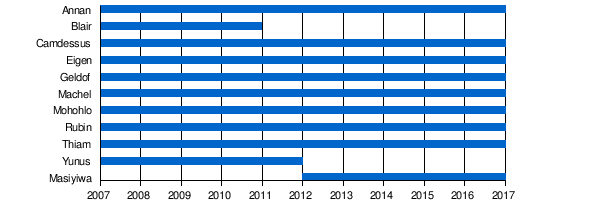The Africa Progress Report
Published annually, the Africa Progress Reports were the flagship publications of the Africa Progress Panel.
Demand for modern energy in Sub-Saharan Africa is set to surge, fueled by economic growth, demographic change, and urbanization. As the costs of low-carbon energy fall, Africa could leapfrog into a new era of power generation. Utility reform, new technologies, and new business models could be as transformative in energy as the mobile phone has been in telecommunications. The Africa Progress Report 2015 explains the bold steps that leaders globally and in Africa must take to achieve this vision. Above all, the report shows that the global climate moment is also Africa's moment to lead the world.
The 2015 Africa Progress Report was launched in Cape Town, South Africa on 5 June 2015 by Executive Director Caroline Kende-Robb and Panel Members Graça Machel, Linah Mohohlo, and Michel Camdessus.
To sustain growth that improves the lives of all Africans, the continent needs an economic transformation that taps into Africa's other riches: its fertile land, its extensive fisheries and forests, and the energy and ingenuity of its people. To achieve such a transformation, Africa will need to overcome three major obstacles: a lack of access to formal financial services, the weakness of the continent's infrastructure and the lack of funds for public investment. The Africa Progress Report 2014 describes how African governments and their international partners can cooperate to remove those obstacles – and enable all Africans to benefit from their continent's extraordinary wealth.
The 2012 Africa Progress Report was launched in London, United Kingdom on 8 May 2014 by Kofi Annan, Tidjane Thiam, Bob Geldof, Peter Eigen and Caroline Kende-Robb.
In 2013, Africa's economies were riding the crest of a global commodity wave that had the potential to transform the continent's prospects. The 2013 Africa Progress Report explains how this unprecedented opportunity might lift millions out of poverty and improve the prospects of future generations by strengthening fiscal policy and increasing equitable public spending on infrastructure, health, education, water, and sanitation.
The 2013 Africa Progress Report was launched at the World Economic Forum on Africa in Cape Town, South Africa on 8 June 2013 by Kofi Annan, Linah Mohohlo, and Strive Masiyiwa.[3] The report's hard-hitting findings and policy recommendations received substantial international attention.
The 2012 Africa Progress Report looks at three of the most critical ingredients for transforming a promising economic upturn into a sustained recovery and lasting human development – jobs, justice and equity. The report explores the fundamental role jobs play in African's life-chances, and hones in on how, over the long run, issues of injustice and inequality can undermine long-term economic growth, productivity and the development of markets.
The launch of the 2012 Africa Progress Report was covered by international news publications, including The Wall Street Journal,[4] The Guardian,[5] The Financial Times,[6] and the African Business Magazine ran a cover story based on the report.[7] As part of the launch, Executive Director Caroline Kende-Robb and Panel Member Olusegun Obasanjo were interviewed for the video series This Is Africa.[8]


